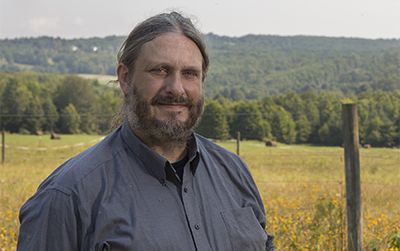
IMPROVING CAMPUS INFRASTRUCTURE
Some of the major improvements to infrastructure completed over the summer are very visible; others are not. Read in this issue about the many major projects completed by Physical Facilities and Information Technology Services, as well as the new programs offered by the University Center for Training and Development.

SCHOOL OF PHARMACY AND PHARMACEUTICAL SCIENCES OPENS NEW BUILDING
The opening of the new, $60-million School of Pharmacy and Pharmaceutical Sciences at the University's Health Sciences Campus in Johnson City, N.Y., headlines this quarterly report, but there's also good news about collaborations, external funding and student successes. Read more in this issue.

SUCCESSFUL INITIATIVES SUPPORT STUDENTS
It takes donors at many levels to make Binghamton University successful, and in this issue of the quarterly report, you can read about a number of them. Whether it's AVANGRID offering full-tuition scholarships and capstone project support, or playing golf to benefit the Alumni Legacy Scholarship, the Division of Advancement works with Binghamton supporters.

BINGHAMTON RESEARCH FUNDING SETS RECORD
Binghamton University reported research expenditures totaling $47.5 million in 2017-18, an increase of about 19 percent from the previous fiscal year. The figure tops 2011-12, the campus’ all-time best year for research funding, when just over $40 million was reported. The new record, which follows several years of steady growth, is an important sign of the campus’ creativity and innovation. Healthcare research accounted for nearly a third of expenditures, with electronics packaging and systems engineering following at about 22 percent.

BAXTER THE BEARCAT BOOSTS SCHOOL SPIRIT
The Division of Student Affairs spent the summer hosting students and families for orientation and preparing for the opening of the fall semester. With some new people on board and some others with new duties, it has been a busy time. Not too busy, though, to show Binghamton University pride, as you'll read about the new Baxter the Bearcat Bench in the University Union in this issue.

STUDENT-ATHLETES CONTINUE TO SUCCEED ACADEMICALLY
Student-athletes continue to shine on and off the courts and fields. The Athletics Department sets high academic standards, and student-athletes surpass them across the board. Read about the accomplishments made by student-athletes in their sports and in the classroom – and check out the videos showcasing fall sports and the new women's head basketball coach, Bethann Shapiro Ord, in this issue.

HELPING TO MAKE THE CAMPUS MORE INCLUSIVE
The Division of Diversity, Equity and Inclusion works to educate and empower everyone on campus in ways that create a welcoming community. From the Udiversity Educational Institute, that holds trainings for students, faculty and staff, to the Multicultural Resource Center and Q Center, the division's offices that work to build bridges and support students though education and events such as Sundaze, part of its Welcome Week programming. Read about the division's recent initiatives in this report.

DONOR SUPPORT ADVANCES BINGHAMTON UNIVERSITY
The Binghamton University Foundation had a successful 2017-18 year, bringing in the second highest amount of cash ever in support of the University. Read the numbers in this issue of the quarterly report, and learn one way the Foundation celebrates its donors.
Ancient DNA preserved in humans, study finds
 Residents of the remote equatorial islands of Melanesia share fragments of genetic code with two extinct human species. That’s the key finding of a new study published March 17 in the journal Science.
Residents of the remote equatorial islands of Melanesia share fragments of genetic code with two extinct human species. That’s the key finding of a new study published March 17 in the journal Science.
An international team contributed to the research, which compared the DNA sequences of 35 modern people living on islands off the coast of New Guinea with DNA drawn from two early human species: Denisovans, whose remains were found in Siberia, and Neandertals, first discovered in Germany.
“Substantial amounts of Neandertal and Denisovan DNA can now be robustly identified in the genomes of present-day Melanesians, allowing new insights into human evolutionary history,” they write. “As genome-scale data from worldwide populations continues to accumulate, a nearly complete catalog of surviving archaic lineages may soon be within reach.”
D. Andrew Merriwether, a molecular anthropologist at Binghamton University, collected the modern-day blood samples used in the study about 15 years ago in Melanesia. This is the first time full genomes from those samples have been sequenced.
“I’m surprised that these Neandertal and Denisovan genomes made it out to this remote place,” he says. “We know people have been there for at least 48,000 years because we find human remains that go back that far, but no one has ever been able to connect them to any other place. When you compare most of their genome sequences, they don’t cluster with any other group. They’ve been there and been isolated for a very, very long time.”